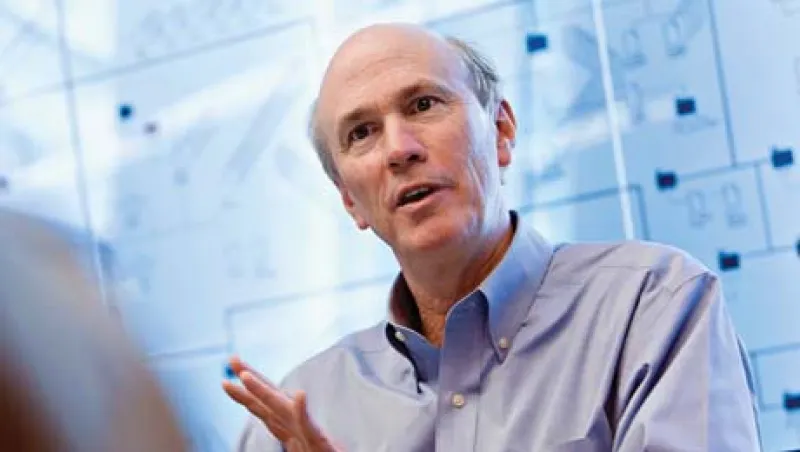Francis (Frank) Blake needed more than a hammer and a few nails when he got the top job at Home Depot. Blake took over as chairman and CEO of the U.S.’s fourth-largest retailer in January 2007, just as the financial crisis was starting to fester. In a surprise appointment the executive vice president replaced Robert Nardelli, who had overseen the Big Orange Box’s dramatic growth during the U.S. housing boom. Nardelli’s top-down management style clashed with the warmer Home Depot culture instilled by founders Arthur Blank and Bernard Marcus.
Self-effacing and candid, the 62-year-old Blake is the opposite of his predecessor and former General Electric Co. colleague. But he still had to confront some ugly economics. Seeing that the home improvement chain itself needed major repairs, he laid off 11,000 staff, sold HD Supply in 2007 and closed the Expo Design Center division in 2009.
Blake rebuilt Atlanta-based Home Depot’s supply chain and rethought its retail strategy. To this day he still taps Blank and Marcus for advice on how to improve customer service and stay true to the original values of the company they launched in 1978.
Today things are turning around for Home Depot, which had sales of $68 billion and earnings from continuing operations of $3.3 billion in 2010. Thanks to Blake’s renovations, it’s performed well during this year’s weak housing and job market. Raymond James Financial upgraded Home Depot shares to a strong buy from market perform after a solid second quarter; net earnings were $1.4 billion, or $0.86 per share, versus $1.2 billion, or $0.72 per share, during the same period last year. Diluted earnings per share grew 19.4 percent over 2010.
To rally his 321,000 troops at the more than 2,200 Home Depot stores in the U.S., Canada, Mexico and China, Blake relies on down-home courtesy. He’s proud of his tradition of hand-writing thank-you cards to employees on Sundays.
His inspiration for this gesture: then–Vice President George H. W. Bush, for whom the onetime lawyer served as deputy general counsel from 1981 to 1983. “He’d spend an hour every morning writing notes to people,” recalls Boston native Blake, who has a JD from Columbia Law School. “As a staff member, I remember the feeling of getting a note from the vice president of the United States saying ‘nice job’ on something. That makes a difference.”
For much of his career, Blake moved between government and industry. He traded law for business at GE from 1991 to 2001, starting as general counsel for GE Power Systems on his way to becoming the parent company’s senior vice president of corporate business development. He then returned to Washington to serve as deputy secretary of the U.S. Department of Energy, where he managed a $19 billion budget. In 2002, Home Depot recruited Blake to lead its business development and corporate operations; he was named vice chairman of the board in October 2006.
Blake recently talked with Staff Writer Julie Segal about Home Depot’s leadership, culture and turnaround.
Institutional Investor: You have an unusual background for a CEO.
Blake: Half of my career was spent as a lawyer. I was in and out of governmental roles, and I had a private practice. Then when I went to GE, I moved from the legal to the business side. There’s always a little bit of legal training that’s relevant, maybe just in terms of how you phrase questions. I joke that law school consists of taking normal people and getting them to worry about what no sane person would worry about. There’s a level of worrying that comes with that I guess you keep.
What business leaders have informed the way you run Home Depot?
I’ve been fortunate in my career to work for some extraordinary leaders, first among them [former GE chairman and CEO] Jack Welch. When I got this job, I asked Jack if he’d spend some time with me. He was very gracious and spent a whole afternoon. I had in my GE career done many pitches and presentations to Jack where you needed to know everything about the business from the smallest number up. So that’s what I did for him. But he didn’t want any of that. He said: “Take me through your organization. Describe the people — what you see as their strengths and weaknesses, how you are going to develop them, how you are going to deal with the people you think aren’t contributing as much as they should.”
You were in government for a long time. What did you learn from that?
Not to go back into government! Government is just completely different. We had a group of senior government executives who were in and working on best practices for business. I was here at Home Depot, and they heard from lots of our executives. But then I talked to them and I said, “Now, in honesty, don’t we all know this is a little bit beside the point, because your life is ruled by a 25-year-old staffer who works on the Hill, who controls your appropriations budget, and what he or she wants to do is what you’re going to end up doing.” They all just broke up like, “Oh, my gosh. He’s actually been there. He understands.”
You haven’t wanted to be a CEO since you were five, like many stereotypical leaders. How does that inform what you do?
I didn’t anticipate being in this position within a second of being in this position. I’d say it probably makes it more obvious that you need help. It makes you say, “Okay, I’ve got to have a great team around me, because there’s too much I don’t know.”
You were the natural person to take over the CEO role when you did, but your appointment surprised a lot of people. Why?
If I were doing my own self-assessment, I’d say not a lot of deep retail experience. The first thing I said when I sat down with our investor and analyst community, and the first thing I said internally, was, “I’m not looking for a team of people that look like me.” I was looking for a team with really deep expertise and leadership capabilities in our retail space.
You’ve just come off this great quarter. Tell me about what you’ve put in place to make that happen.
We set some pretty aggressive goals. If you go back a few years, we knew we had two big competitive shortcomings. One was our supply chain, and the other was our retail systems. We’ve rebuilt our supply chain in three years, which for a company of our size is a significant undertaking, and we did it pretty much without a hitch. New systems that have been put in place for our merchandising and store operations teams have made a real difference.
Customer service had been a shortcoming for Home Depot.
We’re not there. We do over a billion transactions a year. It seems like every customer has figured out my e-mail address. I know we still have opportunities, but I think we’ve made a lot of progress. We’ve made a lot of progress on our merchandising side as well. This one is maybe less immediately apparent, but it’s important to us that we’ve been reducing the promotional activity in the business and getting more to an everyday pricing.
You’ve rebuilt the culture of Home Depot, getting it back to its roots.
My dominant comment there would be that I didn’t rebuild the culture. The culture was always here. If somebody had said, “Okay, Frank, here — blank sheet of paper. Go create a customer-focused culture in a company of 300,000 people,” that would have been pretty difficult. We just went back to some foundational statements from Bernie Marcus and Arthur Blank in terms of our company values and what we stand for. People go: “Got it. I remember that. I know what that felt like.” If you take care of your associates and take care of your customers, everything else takes care of itself.
You like to walk the aisles of your stores. Tell me about that experience and what it gives you.
Being in the stores is really important, and acknowledging how core to the company the stores are is critical. Each time I’m in the store, my hope and expectation is that it’s an opportunity for the store manager to recognize associates.
So it’s about recognition?
It really is. I can’t spend enough time recognizing our associates for the hard work they’re putting in.
And what do you learn?
My son, who works for the company, says to me all the time, “I’m sure that briefed well in Atlanta, but . . . ” Then you get, “Here’s the reality of how this thing unspools when you’re actually implementing it in the store.” So I get to talk to customers, and the customers give me another dose of reality. Understanding the frustrations of our associates and understanding the frustrations of our customers — again, I’d say that’s pretty central to my job.
How do you manage a company in the economic climate we’re in right now?
Let me take one step back and say we’re incredibly fortunate in that Home Depot is a very, very strong business. We have terrific cash flow. As the business was under stress — and it was under a lot of stress — we were still able to invest, even in the face of the downturn. We’re differently situated from other companies that might have been scraping the bottom in terms of cash flow. So it’s more from a leadership team’s perspective. How do we identify the right things to invest in that will make a difference for the company in the short, mid- and long term? But we understand we can’t do everything we want. I’ve got a lot of really creative, smart people here, and if we had more money, we could do even more things. But a big part of the challenge is figuring out what you’re not going to do and then staying disciplined. For us, not building stores. That’s been a big adjustment for us.
Right, because you have to find growth in other places. But it must be tempting.
Yes. Everybody’s reflex is to build stores, add square footage. We are building stores in Mexico, but outside of that, we’re really not building. We’ll open two stores in the United States this year.
You are so tied to the housing market. You probably know that market better than anybody.
The good news for us is that our results have actually disconnected from the housing market, so even though the housing market has continued to go down, we’ve thankfully picked up the pace.
Is that because people are improving what they have?
Right. Even though home values are down, even though existing-home turnover is down, even though new-housing starts are at a ridiculously low level, houses are still where we live. It’s still the No. 1 asset in most of our personal portfolios. Customers are still interested in doing projects around the house. Obviously, we see more of a shift to basic repair and maintenance, but small upgrade projects, painting projects, gardening projects — stuff like that is actually fairly resilient. For the housing market as a whole, it’s been one of these things where every year at this time you go, “Okay, well, it didn’t happen this year, and the first half of next year is going to be really tough, but it’s going to start picking up in the back half of next year.” I think we’ve been saying that since 2006. Now everybody is going: “Maybe it’s not the back half of next year. Maybe it’s more like a year and a half from now.” It’s going to be slow.







